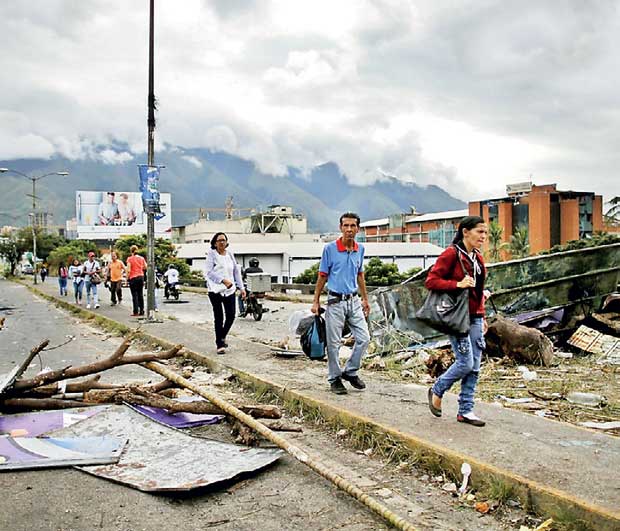02 Aug 2017 - {{hitsCtrl.values.hits}}

By Anthony Faiola, Heather Long
(c) 2017, The Washington Post · · Aug 01, 2017 -
CARACAS, Venezuela - The Trump administration on Monday imposed sanctions on President Nicolás Maduro, after an election that critics called a tipping point toward dictatorship. But even with international pressure building and Venezuela’s economy collapsing, beleaguered opposition activists here were facing a stark new challenge.
How could they confront a socialist machine that now controls all branches of government?
Citing Maduro’s “outrageous seizure of absolute power,” the U.S. government froze any American assets he may have and banned Americans from doing business with him. The move came after Maduro heralded the Sunday vote creating a new super-congress made up entirely of government backers. The newly cast legislators included his wife and son. The body will have sweeping powers to rewrite the constitution and redraw Venezuela’s governing system.
“Maduro is not just a bad leader,” said President Trump’s national security adviser, H.R. McMaster. “He is now a dictator.”
Despite the tough talk from the White House, the sanctions fell short of the crippling pressure many observers were expecting. Maduro swiftly dismissed the measures, saying on television that they were imposed because he didn’t obey the “North American empire.” He added: “Impose all the sanctions that you want, but I’m a free president.”
Potentially more-sweeping measures - including the targeting of Venezuela’s all-important oil industry - are still on the table. But the opposition here is running out of time to turn the tide, and is now facing new and significant threats.
The election was boycotted by the opposition, and many Venezuelans mocked the government’s contention that more than 40 percent of voters took part. Under Maduro’s mentor, the late leftist leader Hugo Chávez, many Venezuelans thought national election results were generally credible, although candidates complained that he used state resources to gain an edge. But opposition activists called Sunday’s vote a turning point, claiming that only about 12 percent of Venezuelans turned out, in what they called a historic rejection of Maduro and his plans.
Luisa Ortega Díaz, Venezuela’s attorney general, who broke with the government in March, on Monday declared the vote fraudulent. She suggested that Maduro and his inner circle, including a vice president accused by the U.S. government of narco-trafficking, would now seek to use the new assembly to monopolize money and power.
“How will we control the public budget now? How will we know how much and in what things money is being invested? How amazing for them!” she said.
“This is not the project Hugo Chávez wanted for the country,” she continued. “Far from it.”
Maduro has said he proposed the assembly to bring peace to the streets after four months of often-violent demonstrations protesting the dire state of the economy and growing authoritarianism.
Opponents said he skewed the system for choosing candidates to ensure control of the new body.
On Thursday, those chosen for the new Constituent Assembly are set to replace the democratically elected members of the nation’s legislature, which is dominated by the opposition. Some opposition lawmakers defiantly went to the National Assembly building on Monday, vowing to keep carrying out their duties. It foreshadowed a potentially dramatic standoff.
16 Nov 2024 2 hours ago
16 Nov 2024 2 hours ago
16 Nov 2024 3 hours ago
16 Nov 2024 3 hours ago
16 Nov 2024 3 hours ago